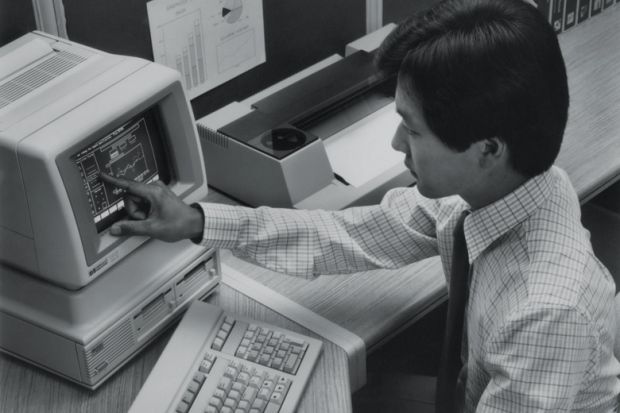The advent of word processing changed many things about the craft and practice of writing. For many, the act of observing the traces of green phosphor on a screen rather than watching the emergence of crisp carbon-film letters on to smooth bond paper made the process seem less final, more ephemeral. By merely leaning on the backspace key you could permanently erase this record of your thoughts with much less drama than tearing the page from the typewriter carriage, crumpling it and lobbing it into a wicker bin.
For the inept among us, word processing removed for ever the trauma of reaching the last line on a page of typescript only to realise that you had just typed the wrong word – and being left with the dilemma of whether to retype the whole page, Tipp-Ex out the offending word and spoil the effect, or recraft the planned sentence to make the errant word fit in.
In his own word-processed volume, Matthew Kirschenbaum collects and collates gems from the history of both computing and writing – drawing together developments, stories, anecdotes and ephemera from the first half century or so of word processing’s relationship with literature. In the late 1960s, the earliest systems were – to the modern eye – quirky and arcane creations, specialised office tools nevertheless seized upon by authors keen to explore the potential they offered.
Those who grew up alongside the development of this technology, as I did, will recognise many half-forgotten old friends in this book – innovative and often wildly expensive developments such as the WordStar program, which I still treasure a copy of. My version, written in 1983 for the CP/M operating system, cost an eye-watering £399 – almost exactly what I earned in a month at the time. But as their potential was realised, in both senses, more developed word processors – both as stand-alone products and as software on general purpose computers – rapidly became mass market, significantly democratising access to the new tools of writing in a way not seen since the advent of the cheap portable typewriter.
Key to the success of Track Changes is Kirschenbaum’s knack of drawing out the relationship between writers and how they adopted, and adapted to, the new tools – the way the word processor itself became embedded in the act of writing as a sort of silicon Sancho Panza, illiterate itself but there to back the writer up in a tight spot. Early adopters such as Stephen King, Len Deighton, Douglas Adams and Anne McCaffrey faced a riotously varied ecosystem in which file, disk and interface formats were often wildly different, incompatible and exotic.
In building a working environment from such components, the author’s own character could became entrained in the device to such an extent that, for example, tech and science fiction writer Jerry Pournelle gave a name to his word processor (“Zeke”) and often wrote affectionately about “him” in his column in Byte magazine. In many respects this book is an engaging, extended love letter to the word processor – but it is much more than that. It is an impressively researched record of a radical, perhaps uniquely creative, chapter in the often turbulent relationship between technology and the written word.
John Gilbey teaches in the department of computer science, Aberystwyth University.
Track Changes: A Literary History of Word Processing
By Matthew G. Kirschenbaum
Harvard University Press, 368pp, £20.00
ISBN 9780674417076
Published 26 May 2016
Register to continue
Why register?
- Registration is free and only takes a moment
- Once registered, you can read 3 articles a month
- Sign up for our newsletter
Subscribe
Or subscribe for unlimited access to:
- Unlimited access to news, views, insights & reviews
- Digital editions
- Digital access to THE’s university and college rankings analysis
Already registered or a current subscriber?




